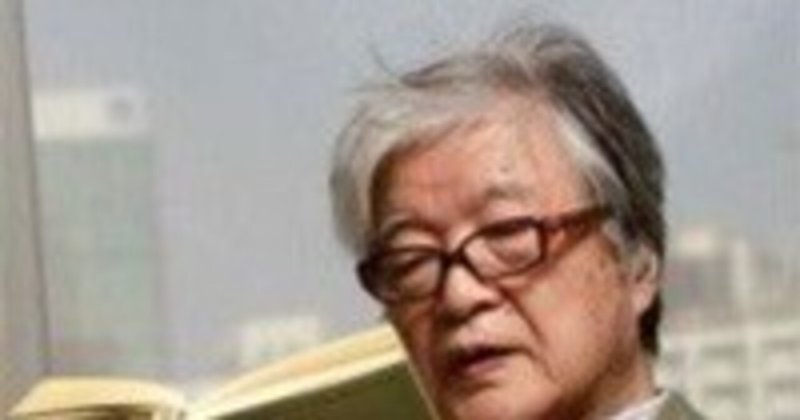
「書物の達人」丸谷才一(まるやさいいち)(英語対訳)6 “A Master of Books” Maruya Saiichi (Japanese-English Translation) 6
「書物の達人」丸谷才一(まるやさいいち)(英語対訳)6
(6)丸谷才一の挨拶文学
東京新聞(二〇一二年十一月九日夕刊)に「丸谷才一と「挨拶文学」」というコラムがあります。丸谷才一の偉業の一部をこう讃(たた)えています。「~挨拶文学、というジャンルを作ったのも丸谷才一であったのだ。下らぬ永々しい挨拶をやめ、ぴりっとした味のある社交のために、ずいぶんと励んでいた。」
丸谷才一の挨拶文学書として『挨拶はむづかしい』『挨拶はたいへんだ』『あいさつは一仕事』(いずれも朝日新聞出版・朝日文庫一九八五~二〇一〇年)の三冊があります。作家野坂昭如夫妻の結婚披露宴の仲人としての挨拶に始まり、ご自身の読売文学賞研究翻訳部門受賞挨拶に至るまで、五十年間にわたり、祝宴祝辞から葬儀の弔辞、軽いものから重いものまで、あらゆる場面で挨拶した「原稿」が収められています。「原稿が残されている」とは、丸谷才一は挨拶をする時あらかじめ原稿を書き、それを読むという事を原則としていたからです。 弔辞や媒酌人挨拶など特別な場合を除けば、「挨拶にいちいち原稿を読むのは、いかがなものか」と言われがちですが、丸谷才一の見解は違う。原稿も書かずに、出たとこ勝負の挨拶でしどろもどろになり、話しがあっちへとび、こっちへ戻りを繰り返し、気がついたら十分以上長々と退屈な話しを続ける「困った人」が少なくないと嘆いています。 「はなはだ簡単ではありますが」との言葉で締めに入った時には、話し始めから十五分が過ぎていた、などという場面はそう珍しくありません。
丸谷才一はイラストレーターの和田誠との対談で、一連の挨拶の本を書くにあたっての動機をこう話しています。 実は突然の指名で、「挨拶は大変だとも、むずかしいとも、一仕事だとも何とも思わないで、ただ出ていって何かダラダラしゃべって人を困らせるという、そういう偉い人が多いでしょう?~そういう人を含めて挨拶をする人に警告を発している。」ということで挨拶させられることがあると言う。もちろん会に臨む時、丸谷才一のような名人は「万一の場合」に供えて、原稿にはしないまでも、場面に応じたエピソードのいくつかを過去の知識や、会場観察から見つけ出す「技法」が身に付いています。実際には我々のレベルなど比較にならない上質な挨拶を即興で行うことになります。あらかじめの「ご挨拶を御願いします」との要請に応えて、何日もかけて原稿にしたためた挨拶の完成度の高さが推察できます。「名人」も努力しているのです。
和田誠は対談の中で「丸谷流挨拶の心得」を実に的確に整理して示しています。挨拶名人の挨拶など、我々には関係ないなど耳を塞ぐのは大損です。対談の中で、丸谷才一が挨拶の心得七項目をあげています。①「原稿を作って準備する」、②「長すぎるのはだめ」、③「余計な前書きを入れるな」、④「引用はひとつにせよ」、⑤「おもしろい話をいれろ」、⑥「ゴシップを有効に使え」、⑦「悪口言うなら対策を考えておけ」。筆者はこれらを参考にして挨拶文を書いて挨拶しました。
“A Master of Books” Maruya Saiichi (Japanese-English Translation) 6
(6) Maruya Saiichi 's Greeting Literature
The Tokyo Shimbun (evening edition of November 9, 2012) has a column called ``Saiichi Maruya and ``Greeting Literature.'' This is how we praise some of Saiichi Maruya 's achievements. ``Saiichi Maruya was the one who created the genre of greeting literature. He stopped using boring, long greetings and worked hard to have a more vibrant social life.''
There are three books written by Maruya Saiichi about greetings: ``Greetings Are Difficult,'' ``Greetings Are a Tough Job,'' and ``Greetings Are a Task'' (both published by Asahi Shimbun and Asahi Bunko, 1985-2010). Starting with his greetings as a matchmaker at the wedding reception of the writer Akiyoshi Nosaka and his wife, and ending with his acceptance speech at the Yomiuri Literary Award in the Research Translation category, he has written congratulatory speeches at banquets and eulogies at funerals, from light to heavy, over 50 years. It contains "manuscripts" of greetings in various situations. The phrase ``the manuscript remains'' is because Saiichi Maruya 's rule was to write a manuscript in advance and read it before giving a greeting. Except for special occasions such as condolence speeches or greetings from a matchmaker, people tend to say, ``It's a bad idea to read the manuscript for each greeting,'' but Saiichi Maruya has a different opinion. He didn't even write a manuscript, and when he appeared, he got flustered at the greeting, and the conversation kept going here and there, and then back again, and before he knew it, there weren't many ``troubled people'' who were continuing to talk boringly for more than ten minutes. He laments that there isn't. It is not uncommon for him to say, ``It's very simple,'' and end the conversation by the time he starts speaking for 15 minutes.
In a conversation with illustrator Makoto Wada, Saiichi Maruya explains his motivation for writing this series of greetings books. In fact, due to his sudden appointment, he said, ``Aren't there a lot of great people who don't think greeting people is difficult or difficult or that it's a job, but just go out there and talk lazily and annoy people?'' I am issuing a warning to anyone who greets people, including such people. Of course, when attending a meeting, a master such as Saiichi Maruya makes an offering in case of an emergency, and even if he does not write it down in a manuscript, he finds out some of the episodes appropriate to the occasion from past knowledge and observation of the venue. I have mastered the techniques. In reality, they will be improvising high-quality greetings that are incomparable to our level. You can guess the high level of perfection of the greeting, which took many days to prepare in response to a request in advance for a greeting. Even the “masters” are working hard.
In his conversation, Makoto Wada organizes and explains the ``Maruya style of greetings''. It would be a great loss to turn a blind eye to the greetings of master greetings, saying they have nothing to do with us. In the conversation, Saiichi Maruya lists seven things to keep in mind when greeting someone. ① ``Create and prepare the manuscript,'' ② ``Don't make it too long,'' ③ ``Do not include an unnecessary introduction,'' ④ ``Use only one quotation,'' ⑤ ``Include an interesting story,'' and ⑥ ``Do not include gossip.'' Use it effectively.'', ⑦. ``If you're going to say bad things, think about countermeasures.'' The author used these as a reference when writing a greeting. (To be continued)
この記事が気に入ったらサポートをしてみませんか?
